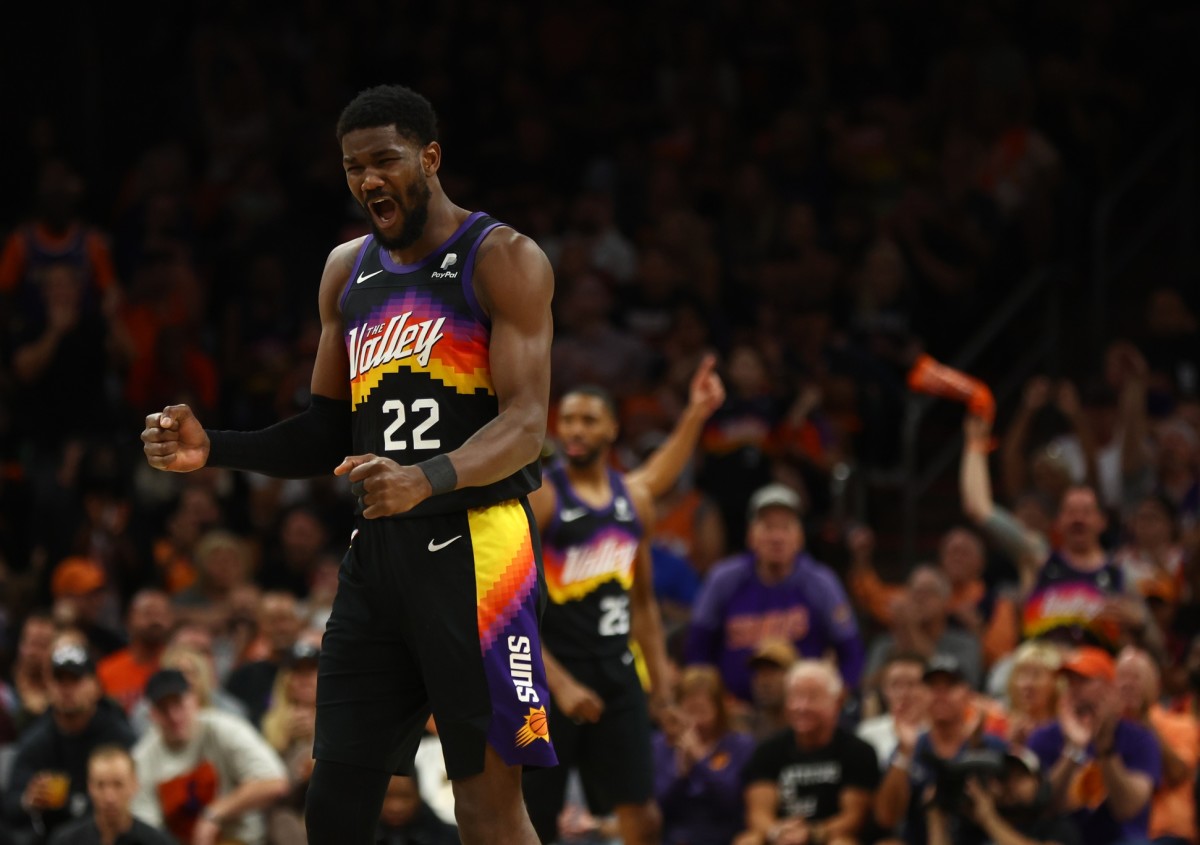Mavs vs. Suns: Coach Jason Kidd Compliments Ayton, Jabs Jazz' Gobert & Whiteside
DALLAS - The Utah Jazz are now an afterthought for the Dallas Mavericks as their focus is on the reigning Western Conference champion Phoenix Suns. Among the key factors in their next matchup is Deandre Ayton, who presents a different type of challenge than Rudy Gobert and Hassan Whiteside.
"We have to adapt," Mavericks coach Jason Kidd said. "Our game plan against Utah is not going to work against the Suns. We've already changed that mindset because we're not playing the Jazz. ... (Ayton and company) can hurt you in the paint ...
"This isn't Gobert or Whiteside. These guys can put the ball in the basket.''
When evaluating the Jazz as a matchup, it doesn't take long for the paint protection of Gobert to become a focus. He anchors a unit riddled with underwhelming on-ball defenders and for as great as he is in that regard, a team going small and getting hot from deep can counter.
Early in their series against the Jazz, the Mavericks made it a priority to deploy Maxi Kleber at the center position in plug-and-play lineups. The offense understood they could get by their man out in space and that Gobert was going to favor sagging off to protect the paint.

Whether Gobert was making a low-man rotation or was engaging in drop coverage against a ball screen or handoff, the Mavericks' catch-and-shoot threats spacing and involved in actions were afforded added confidence. Those are the unmeasurable elements of basketball that can make a difference over the course of a game, let alone a series.
As the series unfolded, Gobert was staying home on shooters more — opening up the floor for the Mavericks' offense to attack. To make matters worse for Utah, most of the Jazz's defensive breakdowns were the fault of a perimeter player being unable to contain dribble penetration or whiffed on sticking to their principles on X-outs or weak-side actions.
While Gobert may be vulnerable to getting bested by a dynamic offensive threat like Doncic or Brunson out in space (like any big), Gobert is more than capable of playing out in space defensively. However, his borderline inept offensive game when not doing simple play-finishing is where the brunt of his blame is deserved.
If Gobert could punish a smaller player like Kleber trying to play center or bully a perimeter player like Doncic on a switch, the Mavericks perhaps would have had to think twice about going small as often. Instead, it's a win for the defense for Gobert to have the basketball with the need to make something happen from his own creation.
The Jazz did not look to give Gobert many post touches often in the series, and it's easy to see why. It was on full display during Game 6 when he came up empty on a pair of post-ups against Doncic. Gobert called his own number after seeing he had a mismatch but was unable to execute.
Earlier in the series, Gobert had a post-up against Kleber where he attempted to execute a drop step but instead dribbled the basketball off Kleber's foot. The lack of feel Gobert displayed on this possession showed the Mavericks they can get away with going small.
Outside of rim rolls where he was able to get a free run at the rim by getting behind the defense, Gobert struggled to get the job done. The Mavericks were able to put him into a panic when the low-man rotated to be in a position to pressure him quickly on the catch.
The Mavericks also benefited from Gobert's rushed approach when he caught the ball deep on the roll. The possessions where he tried to play off two feet with Finney-Smith engaging with verticality resulted in Gobert just flinging the ball and not coming close to connecting.
To Gobert's credit, he did cause some foul trouble issues for the Mavericks by being aggressive on the offensive boards. It still doesn't change how he could have been all the more impactful had he been a legitimate factor with the basketball in the post and on pressured rim rolls.
Deandre Ayton is far more capable of making the defense pay by trying to guard him with a smaller defender. However, it goes well beyond that. His versatility as a scorer is a legitimate weapon and he also has significantly greater playmaking from his teammates than Gobert.
"We have to adapt," Kidd said. "Our game plan against Utah is not going to work against the Suns. We've already changed that mindset because we're not playing the Jazz.
"We understand their strength is midrange, but they hurt you with the 3 in transition and they can hurt you in the paint with JaVale and Ayton. This isn't Gobert or Whiteside. These guys can put the ball in the basket. So, our bigs are going to be tested."
The difference between Ayton and the Jazz's bigs is the respect he commands immediately on the catch. If the big defender doesn't close the gap quickly to engage him on the catch, he will make the defense pay by knocking down a quick jumper.
Ayton is a genuinely crafty scoring threat. He thrives when he can get to his spot for a right-hand hook or turnaround jumper. Given he has a 7-foot-6 wingspan, he's going to get his shot off against just about any matchup, especially if the opposition is going small.
When the defense sends two defenders at the ball against either a ball screen or handoff, Ayton understands he's going to face an aggressive rotation from the low-man making the rotation from the weak side. In a situation where Gobert's awkwardness with the ball may result in a bad outcome, Ayton succeeds.
Even if the low man rotates and is in a position to deter Ayton from going straight into a finish, he is capable of staying poised and making a positive play. In the play below, he ended up in a broken play late in the shot clock along the baseline and still managed to convert on a turnaround jumper. There were multiple defenders in his vicinity, too.
Ayton does an effective job of putting his size advantage to use when going up against a smaller defender. He's shown an ability to use a hard bump after the catch to get to a quick hook. Unless the defender is getting vertical early and absorbs the contact, the outcome is likely going to be a favorable right-hand hook.
It will be important for the Mavericks to make well-timed low-man rotations against ball screens, especially if they are going to show or play close to the level. Not getting distracted by decoy actions is important, too. C.J. McCollum's low-man rotation in the first round after identifying the Spain pick-and-roll.
By making the read, McCollum was in a position to attack the ball on the catch. The Mavericks take pride in how they can swarm on defense within the half-court, and they are going to have to do more of that against the Suns to get the job done.
Much of how the Mavericks' approach containing Ayton will begin with their handling of the Suns' playmakers — Paul and Booker. Similar to how they guarded Donovan Mitchell, they can't afford to allow the Suns' star guards to comfortable get into the gap or turn the corner and force the big defender to step up — allowing Ayton to get behind the defense.
One of the main X-factors in this series will be how small the Mavericks decide to go with certain lineup combinations, and how effective they will be when doing so. If their swarming in the half-court and engaging Ayton on the catch disrupts him, it changes the circumstances a lot.
“I guess that the new era in the league,” Ayton said. “Where 6-foot-7 dudes are fives now, and they try to cancel out the traditional big man role. But if it ain’t broke, don’t fix it. And our stuff over here ain’t broke.
“We stay true to our culture. We try to punish (smaller) matchups, just like how they try to punish bigs on the perimeter.”
The Pelicans were a very favorable matchup for the Suns with the lack of mobility of Jonas Valanciunas topping the list of reasons why. New Orleans was unable to effectively show or switch, often causing them to deploy drop coverage. Chris Paul was able to feast getting to his spots in short range as a result.
Even when the Pelicans deployed Larry Nance Jr., he was unable to contain at the point of attack while also being too undersized to handle Ayton down low. When a switch is made, the big defender involved has to be genuinely capable of sliding their feet and at least rounding off the drive by Paul or Booker.
